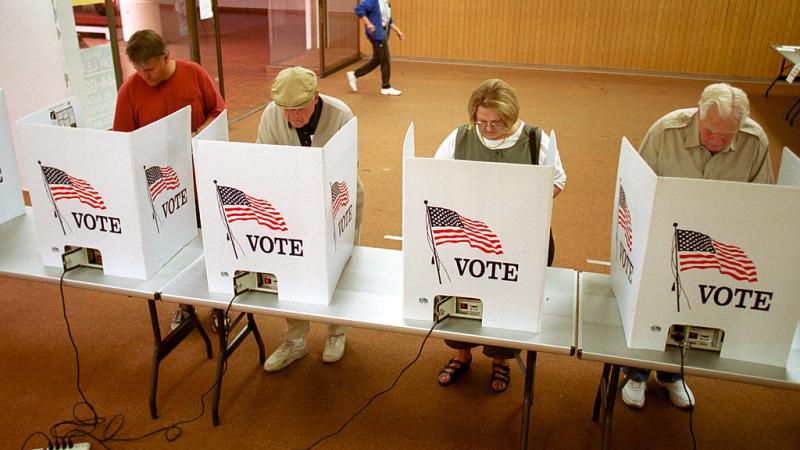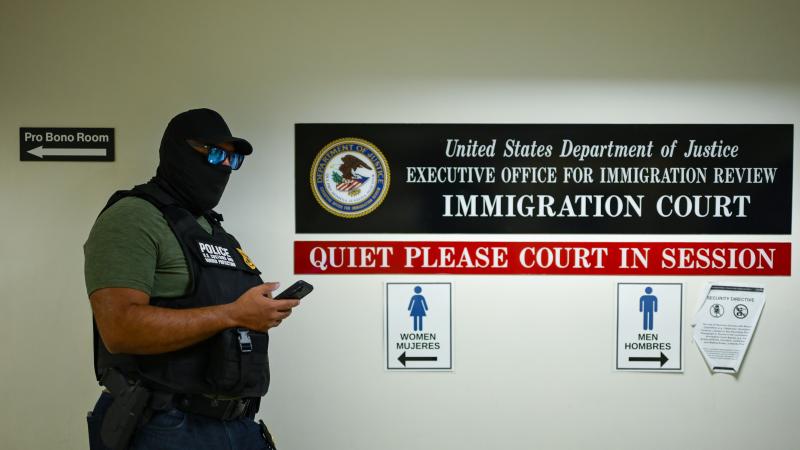Trump’s fight to keep non-citizens off voter rolls reignites in second term
Part one of President Donald Trump's battle to keep illegal aliens off voter rolls began near the end of his first term and will likely come hurtling back in the near future.
The Supreme Court has never made a determination on the legal merits of the argument that noncitizens should not be counted in the United States census, but may soon be forced to do so.
The fight to clarify the census and subsequently adjust congressional seats, Electoral College votes and federal funding, is coming down the pike, according to White House deputy chief of staff, Stephen Miller.
Miller indicated last month that he's eager to dive straight in and that Commerce Secretary Howard Lutnick will help lead the effort.
Trump has at his disposal a number of avenues to accomplish his goal, one of which includes Lutnick's agency. Utilizing this route, the Commerce Department could propose adding a census question to distinguish citizens, legal permanent residents, and unauthorized immigrants, as suggested by a lawsuit filed by Republican-led states and the Department of Commerce in January 2025. The data could then be used to exclude noncitizens from apportionment, though not necessarily from the overall count.
Republican support for this approach is growing, with bills introduced by Rep. Chuck Edwards, R-N.C., and Sen. Bill Hagerty, R-Tenn., to mandate a citizenship question and thus exclude noncitizens from apportionment. A GOP-controlled Congress could facilitate approval of such questions, due by 2028. The Supreme Court’s 2019 ruling rejected the citizenship question due to procedural issues, and demanded a stronger justification for having the case reviewed by the Supreme Court before going to the Court of Appeals for the Second Circuit.
Amending the Census Act is an option
Furthermore, Trump could work with Congress to pass legislation amending the Census Act to exclude noncitizens from apportionment counts or mandate a citizenship question. Bills like those proposed by Edwards and Hagerty aim to achieve this, but such legislation would need to redefine “persons” in the 14th Amendment’s apportionment clause to exclude noncitizens, a significant departure from historical practice. It could also direct the Census Bureau to use citizen-only data for apportionment. With a Republican-controlled Congress, the winds are now more favorable. Passage is significantly more likely than in 2020, when a similar House bill passed on a party-line vote (206-202) but stalled in the Democratic-controlled Senate.
President Donald Trump, on his first day in office, rescinded a Biden-era executive order on January 20, 2025, which had reaffirmed counting all residents regardless of immigration status, signaling intent to revisit this policy. With a GOP-controlled Congress, there may be less political resistance to try again. Additionally, preparations for the 2030 census will begin during Trump’s second term, and federal law requires proposed census questions to be submitted to Congress two years prior, which gives a window to influence the process.
Estimates of illegal alien populations vary due to inconsistent methods and tracking, but based on the most reliable and recent data from multiple sources including the Department of Homeland Security, the state with the highest number of illegal aliens is California, with 2.6 million. Texas took the number two spot with 2.06 million, and Florida comes in at third with 560,000.
New York (with 540,000) and New Jersey (with 440,000) rounds off the top five. Despite the influx of illegal aliens to California, it lost a congressional seat due to the number of residents fleeing the state. The Orange County Register reported that California lost 817,669 residents in 2023 for a net outmigration of 341,866 citizens.
If that trend continues, according to Thad Kousser, who is an expert in California and national politics and a professor of political science at UC San Diego, California will lose another four seats by 2030, even without census criteria changing. Texas would hypothetically gain three seats and Florida would gain three.
Whether noncitizens count for census matters that affect representation
In 2020, the Trump administration sought to exclude noncitizens from the U.S. Census count which is used to apportion congressional seats and Electoral College votes, a move that sparked significant controversy. In July of that year, President Donald Trump issued a memorandum directing the Census Bureau to use administrative records to identify and exclude undocumented immigrants from the apportionment count, arguing that including them dilutes the political power of citizens and constitutes voter suppression.
The administration argued that the Constitution’s mandate to count “persons” did not explicitly require counting noncitizens for apportionment. This effort faced immediate legal challenges from blue states and cities, many of which were sanctuary jurisdictions, and immigrant advocacy groups, who argued the policy violated the Constitution and would discourage immigrant participation in the census, potentially undercounting communities with large noncitizen populations.
The Supreme Court ultimately blocked the Trump administration’s plan in December 2020, ruling that the memorandum was premature and lacked sufficient justification, though it did not address the merits of the Administrations' argument.
Critics, including the American Civil Liberties Union, hailed the decision as a victory for fair representation, while supporters of the policy, including then-Commerce Secretary Wilbur Ross, argued it was necessary to ensure electoral fairness. Without time for the issue to play out further, the Census Bureau claimed it was constrained by time and logistical challenges, and ultimately included all residents in the 2020 count.













